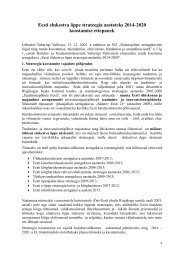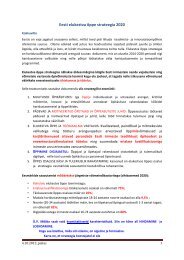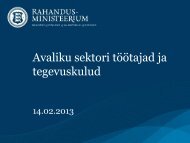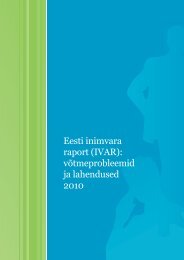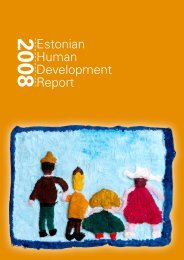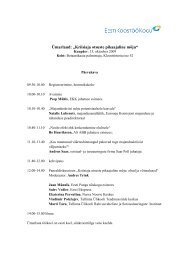DEVELOPMENT
The pdf-version - Eesti Koostöö Kogu
The pdf-version - Eesti Koostöö Kogu
Create successful ePaper yourself
Turn your PDF publications into a flip-book with our unique Google optimized e-Paper software.
5.4<br />
Future perspectives<br />
Erik Terk, Silja Lassur<br />
The survey also examined the Estonian elite’s view of<br />
Estonia’s future perspectives. We start with the significant<br />
shifts forecast for the next ten years. The respondents<br />
were asked to select important positive changes, which<br />
would impact the general situation in Estonia and which<br />
they expect/presume to take place. The top of the ranking<br />
of these shifts is shown in Table 5.4.1.<br />
Considering the level of the change expectation<br />
within the group (majority or minority of representatives<br />
expect the change), the differences of opinions<br />
between the groups and making some hypotheses about<br />
the connections between the shifts (which shifts could<br />
serve as premises for others), we obtained the following<br />
series of somewhat contradictory perspectives of the<br />
future. (When compiling the descriptions, we also used<br />
the assessments for the spheres where only individual<br />
groups expected changes and which were therefore<br />
omitted from the table)<br />
The cultural figures’ vision of the future -- one of<br />
the focal shifts changing the future will be the development<br />
of democracy (at the same time they were pessimistic<br />
about increased personal freedoms). They assumed<br />
that the education level and innovativeness in Estonia will<br />
increase, but in regard to these expectations the cultural<br />
figures were not as unanimous as the representatives of<br />
the other groups. The cultural figures have a somewhat<br />
greater belief than the other groups that the population’s<br />
trust of the state will increase somewhat and that economic<br />
inequality will decrease. The majority of them do<br />
not predict that an increase in the competitiveness of<br />
the economy will be one of the main shifts, which will<br />
change the situation in Estonia – they either do not<br />
believe it will increase, or do not consider it to be of primary<br />
importance.<br />
Economic policymakers’ vision of the future – the<br />
competitiveness of the economy will increase; this will,<br />
apparently, be helped along by improvements in education,<br />
and to a lesser extent, by an increase of innovative<br />
thinking. They do not believe/assume that incomes will<br />
be equalised to a greater extent. Neither do they assume<br />
that trust in the state will increase.<br />
Economic practitioners’ (entrepreneurs’) vision of<br />
the future -- there is a unanimous belief in the increase of<br />
the competitiveness of the economy; this primarily due to<br />
the growth of innovativeness, and to a lesser extent, due<br />
to an increased level of education. They do not believe in<br />
the reduction of income gap; and they believe less in a<br />
significant increase occurring in the population’s income,<br />
than the other groups do. They believe in the strengthening<br />
of the e-governance, but not in the strengthening of<br />
democracy. The entrepreneurs have even less faith than<br />
the others in the people’s trust in the state increasing.<br />
Recent PhD’s vision of the future – they are more<br />
sceptical than the average about the prospects of innovation.<br />
However, the majority believes in the growth of<br />
the competitiveness of the Estonian economy, but not as<br />
unanimously as the other elite groups. They believe in the<br />
increase of the educational level; in increased incomes;<br />
and in a reduction of income differences. Compared to<br />
the other groups, they are somewhat more optimistic<br />
about the reduction of corruption.<br />
Politicians’ vision of the future -- they believe in the<br />
growth of the economy’s competitiveness; in the increase<br />
in people’s incomes; and, for some reason, also, in an<br />
improvement in the demographic situation. The majority<br />
of this group’s representatives think that the given shifts<br />
will increase people’s satisfaction with their lives. Compared<br />
to the average of the respondents, the politicians<br />
Table 5.4.1<br />
The spheres in which the respondents expect major progress during the next 10 years, % of respondents, who chose<br />
the corresponding sphere among their choices (maximum of six).<br />
Entrepreneurs<br />
Economic<br />
policymakers<br />
Politicians<br />
Cultural<br />
figures PhDs Total<br />
Competitiveness of the economy 77 64 67 46 57 61<br />
Education 69 60 51 54 64 58<br />
Extent of innovative thinking 85 67 56 54 41 57<br />
Level of people’s income 46 50 56 51 59 54<br />
Demographic situation 54 48 56 51 36 48<br />
State of people’s health 46 52 40 31 52 45<br />
People’s satisfaction with life 54 40 53 34 43 44<br />
Development of democracy 15 33 30 57 36 37<br />
People’s perception of security 38 26 42 37 32 35<br />
Economic equality/inequality 23 24 35 37 45 35<br />
204<br />
Estonian Human Development Report 2012/2013



